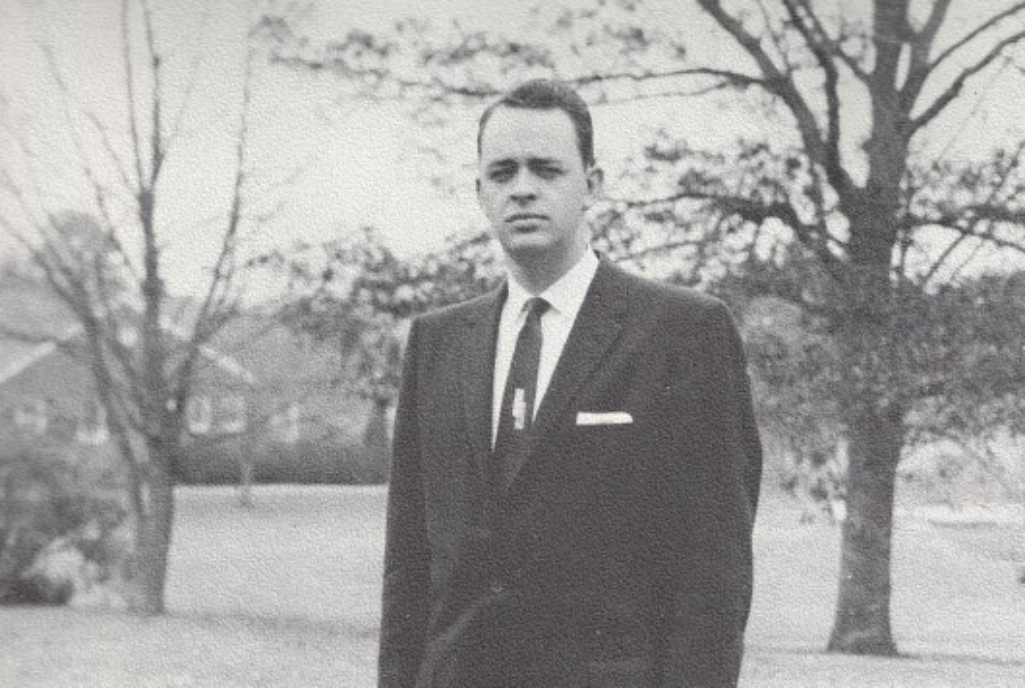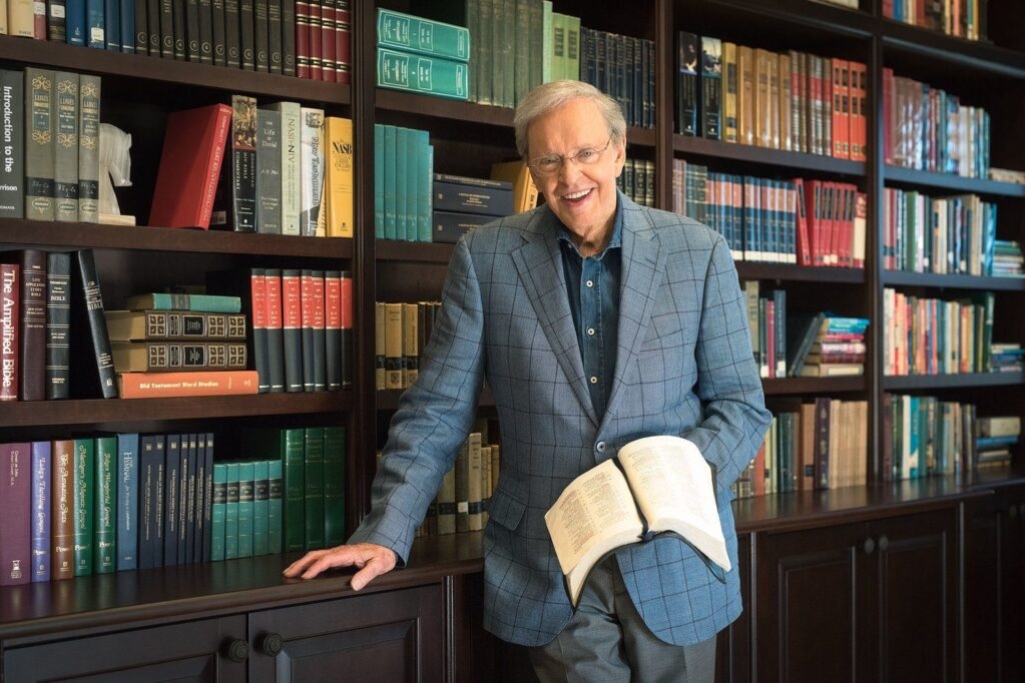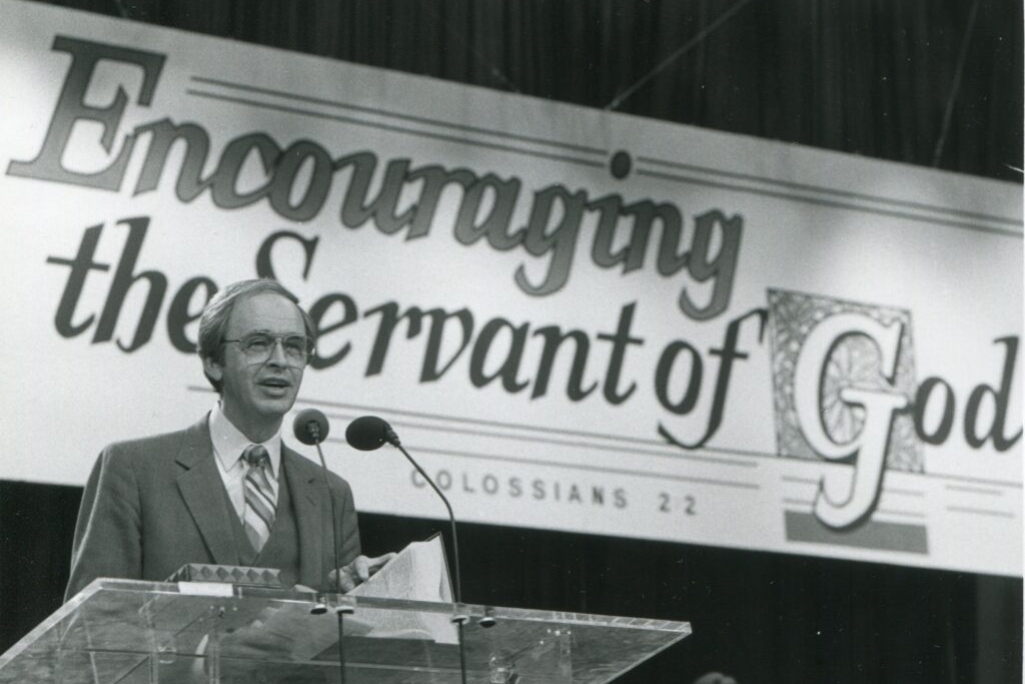
Charles Stanley’s early days in ministry included pastoring Fruitland Baptist Church and teaching at what was then known as Fruitland Baptist Bible College in Hendersonville.
Before becoming a prominent Southern Baptist pastor with a global media ministry that allowed him to preach the gospel to millions of people worldwide, Charles Stanley’s faith was forged by time spent in rural towns in the Piedmont and mountain regions of North Carolina.
Throughout his 65 years in ministry – which included serving two terms as president of the Southern Baptist Convention, authoring numerous books and becoming a popular preacher to audiences around the world through his far-reaching radio and television broadcasts – Stanley frequently referenced times spent in North Carolina as a teenager and later as a young, first-time pastor as being formative and foundational to his life and ministry.
Stanley, who died at his home in Atlanta at age 90 on Tuesday, April 18, often mentioned six days he spent with his grandfather in Siler City at age 16 and approximately two years serving as pastor of Fruitland Baptist Church in Hendersonville – while simultaneously teaching at nearby Fruitland Baptist Bible Institute – in his sermons and writings over the years.
Life principles passed down
Born Sept. 25, 1932, at the height of the Great Depression in the rural farming community of Dry Fork, Virginia, about 20 miles from the Virginia-North Carolina state line, Stanley was raised by a single mother after his father died when Stanley was just nine months old. After trusting Christ as savior as a young boy and sensing a call to ministry by age 14, Stanley credits his grandfather – George Washington Stanley – as having a profound influence on his life.
“Granddad was a fiery, Spirit-filled Pentecostal preacher, so as I contemplated my future as a minister of the gospel, I had a strong desire to spend time with him and learn from his experiences,” Stanley wrote in his 2016 autobiography “Courageous Faith: My Story from a Life of Obedience.”
After planting multiple churches in North Carolina and Virginia, Stanley’s grandfather had retired from preaching and was living in his native Siler City when Stanley took a bus to visit him during the summer of 1949. Stanley spent six days gleaning as much knowledge, wisdom and insight from his grandfather as possible.
“I believe that those were six of the most important days of my life, because they absolutely revolutionized the way I would live and serve the Lord,” Stanley wrote in “Courageous Faith.”
Stanley said his grandfather imparted five guiding principles to him that shaped his life and ministry from that point forward. They were: “1. The most important thing in life is your relationship with God; 2. Obey God, and leave all the consequences to Him; 3. God will move heaven and earth to reveal His will to you if you really want to know it and do it; 4. God will provide for all your needs; [and] 5. God will protect you.”
Fond memories of first pastorate
Following high school, Stanley earned a bachelor’s degree in history from the University of Richmond, and he went on to earn a divinity degree from Southwestern Baptist Theological Seminary in Fort Worth, Texas, in 1957.
In 1956, while on an extended vacation with his wife, Anna, at her family’s cottage on Lake Lure the summer before Stanley’s final year of seminary, Stanley met a deacon from nearby Fruitland Baptist Church. The deacon invited Stanley to preach a couple of Sundays while their pastor, N.A. Melton, was on vacation. Upon Melton’s retirement the following year, the church called Stanley to be its new pastor in June 1957. Fruitland was Stanley’s first pastorate.
Michael Smith, who pastored Fruitland Baptist Church from 1991 to 2016, said several members of the congregation during his tenure attended the church when Stanley served as pastor.
“When I went to Fruitland, all of the older members had stories about Dr. Stanley coming to the church,” Smith said. “Everybody remembered him fondly.”
Smith said his first encounter with Stanley came in 1992 while on a mission trip to St. Petersburg, Russia, following the collapse of the former Soviet Union. Stanley and a team were also there for ministry, and Smith met a member of Stanley’s staff. After the staff member learned that Smith pastored Fruitland Baptist Church, the staffer told Smith, “Dr. Stanley is here, and he will want to meet you.”
When Smith and Stanley met, Stanley couldn’t believe Smith was then the current pastor at Fruitland. After meeting halfway around the world in Russia, Smith and Stanley stayed in touch periodically over the years. During those years, Smith had other meetings with Stanley or his staff on a few occasions.
One day years later while Smith was working in the church office, he answered a knock at the door. It was one of Stanley’s staff members who indicated that Stanley was with them and wanted to know if he could look around the church.
“Of course,” Smith said, who spent some time with Stanley that day reminiscing about Stanley’s time at Fruitland.
Another time, a video crew from Stanley’s staff interviewed Smith about Stanley’s life and legacy in the region.
When Fruitland Baptist Church dedicated a new worship center during Smith’s tenure as pastor, Stanley sent a video greeting when he was unable to attend the service in person.
“He was very gracious anytime I ever encountered him,” Smith said. “He was very approachable. He certainly didn’t act like he was better than anyone or didn’t have time for anyone.”
Smith said he believes one of Stanley’s enduring and endearing qualities is the fact that he preached and taught the Bible in a casual, down-to-earth manner.
“I think people have been drawn to him because he teaches the Bible in a way that’s clear and easy to understand,” Smith said. “He explains it in such a way that his listeners know he cares about them and wants them to understand what he is talking about.”
Trusting & teaching
Shortly after receiving his call to pastor Fruitland Baptist Church, Stanley also received an invitation to teach at Fruitland Baptist Bible Institute, which is now known as Fruitland Baptist Bible College. Stanley began teaching homiletics, preaching and evangelism in the fall of 1957. Many of the approximately 150 students enrolled at the school were older and more experienced than Stanley, but they had not had the opportunity to attend seminary.
In a sermon titled “Those Feelings of Inadequacy” that aired toward the end of his ministry, Stanley recalled his time at Fruitland and how he felt ill-equipped, unprepared and afraid to teach pastors who were more experienced than him. The experience drove Stanley to his knees in prayer to trust and depend on God, which gave him the confidence he needed in his teaching role.
“I felt totally inadequate,” Stanley said. “I walked in on the first Monday to face these guys, [and] I felt like Daniel. And I could not tell you why, except that God did what He promised to do. He said to Moses, I’ll be with you. He said to Gideon, I’ll be with you. He said to Jeremiah, I’ll be with you. He said to Paul, I’ll be with you. That’s all I had to go on.
“And I spent some of the best years [and] happiest times of my life teaching in that institute. God will equip you for whatever He wants you to do, but you have to trust Him.”
Stanley quickly earned the respect of those he taught. A page dedicated to Stanley in Fruitland’s 1959 yearbook reads: “We see in Rev. Stanley a man called of God and committed whole-heartedly to his will. We see in him a man of prayer, a man of conviction, and a man dedicated of God into His service. Although Rev. Stanley is young in years, he is greatly qualified for the task before him….”
Stanley’s bio page in the same yearbook reads: “His techniques and methods of preaching are being felt in pulpits throughout several states. Many men testify to the improvement in their preaching since he came to Fruitland.”
David Horton, current president of Fruitland Baptist Bible College, said Stanley’s legacy is still felt at the school.
“I still talk to students from time to time who had the privilege of being in his classes,” Horton said. “All of us at Fruitland are grateful for his ministry on this campus and for all God did through him in the subsequent years.”
‘Valuable lessons’ & ‘indelible impressions’
Stanley spent two years pastoring Fruitland Baptist Church and teaching at Fruitland Baptist Bible Institute. In November 1959, he accepted a call to pastor First Baptist Church of Fairborn, Ohio. He also pastored churches in Florida before being called to First Baptist Church of Atlanta in October 1969 as associate pastor. He became First Baptist Atlanta’s senior pastor in October 1971. In September 2020, Stanley stepped down as senior pastor after serving the congregation for 51 years.
During his tenure as pastor of First Baptist Atlanta, Stanley’s radio and television broadcasts grew from a local outreach to an international ministry that is known today as “In Touch.” Still, Stanley never forgot the formative years of ministry he spent in North Carolina.
“That first field of service was a very spiritually productive season for us,” Stanley wrote in his autobiography. “God used that church and those circumstances to teach me many valuable lessons.”
In his 1994 book “The Source of My Strength,” Stanley wrote: “I was at Fruitland two years, and I loved every day of our stay there. I prayed and studied and preached and taught day and night. All I did was pray, study, preach and teach. What little time I had for recreation, I hunted in the mountains and fished in the lake.”
After leaving North Carolina to pastor in Ohio, Fruitland Baptist Bible Institute dedicated its 1960 yearbook to Stanley. The dedication offers a somewhat prophetic summary of the qualities and attributes that would mark Stanley’s ministry.
“In appreciation for the indelible impressions made upon us we, the students of F.B.B.I. dedicate the 1960 ‘Inspiration’ to Brother Charles Stanley, previously a member of our Beloved Faculty.
“Even though Bro. Stanley has heeded the call of God again and moved with his family to a new field of service in Fairborn, Ohio he is constantly in the hearts and minds of both faculty and students who had the privilege of knowing him. We can truly repeat an old proverb ‘He is gone but he shall never be forgotten.’
“Brother Stanley, our prayer is that God would ever use you for the up-building and on-going of His Kingdom. We thank you for your sincerity, your prayers for us, your love for and faith in God’s Word, and your love and trust in our Saviour, the Lord Jesus Christ.”


